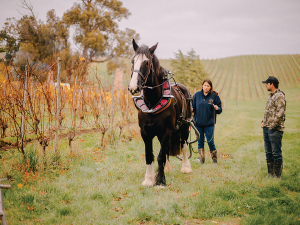Subsidies keeping wind, solar generation viable
OPINION: I recently wrote an open letter to the Prime Minister because at a recent Federated Farmers meeting, Chris Luxon told me wind and solar generation is not subsidised.
 Emma Rossignol and Duchess tending the rows David Herd and his Clydesdales worked 133 years ago. Photo Credit: Gabriel Bertogg.
Emma Rossignol and Duchess tending the rows David Herd and his Clydesdales worked 133 years ago. Photo Credit: Gabriel Bertogg.
David Herd broke boundaries when he planted Marlborough's first vineyard in 1892, surrounded by sheep and crops.
More than 130 years later, Emma Rossignol and her Clydesdale Duchess ploughed the same tiny block, with its heritage Petit Grain Muscat, mānuka posts, and original tōtara strainers, in a quiet echo of yesteryear. "You can hear the working of the soil," says Auntsfield Estate viticulturist Ben Cowley of the machine-free hush of Duchess and Emma walking up the rows, cutting through under vine weeds like a knife through butter.
Emma, who launched her business Terroir & Us last year, learned to cultivate vineyards with a horse in her homeland of France, where growers are increasingly interested in the practice for its lack of emissions, lack of soil compaction, and precise and shallow slicing of weeds, using ancient techniques to meet contemporary sustainability measures.
She worked the 2025 vintage for Auntsfield, and ran an open day there in May, showing growers and viticulturists this one-horsepower Duchess solution, with her hooves the size of side plates. "The job is very detailed and very accurate and very, very good," says Ben. "And it just makes so much sense on that block."
The ploughing marries two of Auntsfield's preoccupations - heritage and sustainability - and he plans to contract Emma to work in the same vines in the future, and on other organic blocks that would benefit from the Duchess touch.
Auntsfield has just under 15 hectares of organics, including his tiny 0.2ha block, and released its first BioGro certified Sauvignon Blanc last year, finding good interest in a market where new products can be hard to find a home for. "In these times when things are a bit harder, it really shows you how important it is to have a strong brand with strong brand ideals," Ben says. "Part of that is environmental credentials and philosophies, which are always really important for consumers and can really set you apart." Being a single vineyard producer, and having organics and sustainability as abiding principles, are important. And so is Auntsfield's heritage, which the Cowley family have protected and celebrated since buying the estate in the late 1990s. "Having Emma and Duchess here, working the vines like David Herd did 130 years ago, feels like the last step in the revival of this historic vineyard," Ben says.
Jimmy Stewart is quite literally chipping away at circularity.
A Wine Marlborough Lifetime Achievement Award is “very premature”, say Kevin and Kimberley Judd, nearly 43 years after they came…
Wine tourism has evolved into a sophisticated, diverse and resilient part of the New Zealand wine sector's economy. Emma Jenkins MW talks…